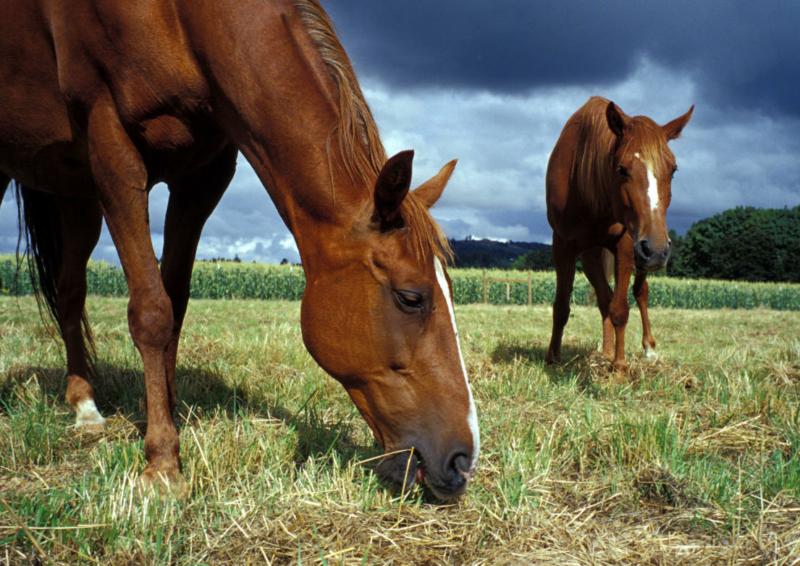
Agricultural News
State Animal Health Officials Monitor Equine Infectious Anemia in Southwest Kansas
Wed, 23 Aug 2017 15:48:52 CDT
 The Kansas Department of Agriculture Division of Animal Health (KDA DAH) is continuing to monitor a facility in Finney County where six horses tested positive for Equine Infectious Anemia (EIA) last week. The facility is under quarantine and the remaining horses at the facility will be observed and retested in 60 days.
The Kansas Department of Agriculture Division of Animal Health (KDA DAH) is continuing to monitor a facility in Finney County where six horses tested positive for Equine Infectious Anemia (EIA) last week. The facility is under quarantine and the remaining horses at the facility will be observed and retested in 60 days.
EIA is an incurable, infectious disease caused by a virus that can affect horses, donkeys, asses and other equine species. This virus destroys red blood cells and is spread through blood-to-blood contact, not through close proximity or casual contact. Clinical signs of EIA include fever, anemia and edema; however, affected horses may not show symptoms. All infected horses, including those which are asymptomatic, are carriers of the disease.
The virus can be transmitted from an infected equine to a "clean" equine by biting flies, the use of unsterilized or contaminated medical instruments, or through a blood transfusion. This disease does not affect humans. KDA has identified a prescribed surveillance area within one-half mile of the affected premises, and is working with local officials and horse owners to identify any other horses that may have been within that surveillance area in order to test those animals.
The surveillance area is identified based on risk associated with the potential transfer of the disease. EIA is mechanically transmitted via the mouth parts of biting flies, and research has shown that the EIA virus survives for a limited time on the mouth parts of the fly vectors, so the area of possible exposure is limited to a relatively small radius around the affected premises. Symptomatic horses, those showing clinical signs, are more likely to transmit the disease compared to those that have an in apparent infection. It is estimated after visiting an asymptomatic carrier, only one out of every 6 million flies is likely to become a vector.
There are typically a small number of cases of EIA in the United States every year, although the disease is common in other parts of the world. EIA is controlled in the U.S. by regular testing before traveling across state lines and/or exhibition. The test for EIA is commonly called a Coggins Test.
Horse owners who have concerns about their animal's health or questions about possible exposure should contact your local veterinarian. For more information about EIA or other animal disease issues in Kansas, go to the KDA DAH website. If you have questions, please call KDA DAH at 785-564-6601.
Prevention and Control of EIA
There is no approved vaccine for EIA in the United States. In order to prevent infection, follow these guidelines:
- Practice good fly control by regular mucking of stalls, proper disposal of manure away from horse stabling areas and use of fly sprays or natural predators to minimize fly presence.
- Use a sterile needle and syringe for all injections or treatments.
- Disinfect any surgical or dental equipment thoroughly between horses. Remove all debris and blood with soap and water before disinfection.
- Only administer commercially licensed blood products.
- Use a sterile needle each time when puncturing a multi-dose medication bottle. Consult a veterinarian to demonstrate how to use sterile technique when drawing up medications.
- Require proof of a recent negative Coggins test at time of purchase or for new horses entering the premises. Require an EIA test for horses which have spent time at a premises where EIA-positive horses have been identified.
- Only participate in events that require evidence of a negative Coggins test for every horse entering the event to prevent disease introduction and spread.
- Separate horses with fevers, reduced feed intake and/or lethargy from your other horses and contact your veterinarian.
Source - The Kansas Department of Agriculture
WebReadyTM Powered by WireReady® NSI
Top Agricultural News
More Headlines...





